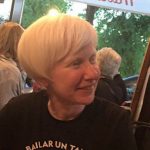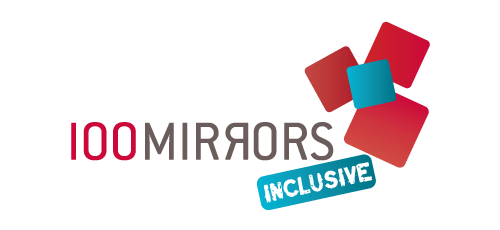
- Maria Peralta
- About Me
- My Background
- My Experience
- My Skills
- Hints & Tips
Name Surname: Maria Peralta
Country: Spain
City: Madrid
Nationality: Spanish
Background: University
Sector: Education and Third Sector
Position: Social Worker and Trainer
I was born in Logroño (La Rioja) in 1975. I am albino, and this caused me a visual disability of 76% since my birth. This circumstance has led me to overcome several obstacles but it has not been an impediment to fully develop my personal and professional life.
Since I was a child I already had a passion for reading and writing, so it was not strange that I chose to study Journalism when I had to choose a university degree. However, over time I realized that my true vocation is to work in direct contact with people, especially those who are at risk of social exclusion for different reasons... In the year 2000 I spent six months in Wakefield (United Kingdom) doing a European Voluntary Service (EVS) in an Occupational Center for people with intellectual disabilities. After this experience I decided to follow my vocation and I studied the Diploma of Social Worker.
When I finished my studies, I started working in the Inter Europe Rioja Association as a Social Worker. There I developed, for ten years, programs of personal autonomy and social inclusion for people with mild and moderate intellectual disabilities.
During my work in this entity, I discovered the 'Easy-to-Read' and I decided to learn this inclusive format. The 'Easy-to-Read' allows me to develop my passion for writing and my vocation as social worker.
In 2014 I moved to Madrid where I started to participate in the newly created Madrid Easy-to-Read Association. In this entity, I develop my project around the 'Easy-to-Read', stimulating training courses related to the 'Easy-to-Read'and with the creation of materials in this inclusive format. These materials have been published by the Editorial La Mar de Fácil and allow access to reading for many people with reading difficulties.
I am the author of the following publications published in 'Easy-to-Read'format: the novel 'Bailar un tango en Madrid', the educational guides 'Take care of your personal image and your social skills'and 'Social skills at work'. All of them published by the Editorial, La Mar de Fácil.
To get where I am, the biggest difficulty I've faced, and I'm still facing, is the economic one. This is because, the creation of materials (copyrights for the created works) and the activities that we carry out around the Association do not involve large income. Currently, we are only two people working in the Association.
For this economic situation makes me have to combine my work in the Association with another professional activity. So, I also work part-time as Social Worker in group homes for the Madrid City Council. And for this reason, I cannot dedicate to my project, Easy-to-Read and its diffusion, all the time that I would like.
But I cannot forget other factors that have helped me to be where I am, such as: the possibility that I had to train over the years in the areas that I have considered most appropriate, or interesting, for my career professional; to have always the support of my family (especially my mother) throughout my life.
Finally, the fact of having a disability made easier to understand other groups that also have a disability. This reality gives me the necessary energy to help in the social inclusion of these people.
With regard to my experience as a coach, I encourage specific courses and workshops for entities that work with people with reading difficulties, especially those entities that work with people with intellectual disabilities, senior citizens and library staff. In these workshops I offer personalized training related to the specific work that each entity or person needs; always related to the creation of materials in Easy-to-Read or / and the revitalization of Reading Clubs. In addition to the training, we offer advice and continuous monitoring once they start their own Easy-to-Read project. My studies have presented me with several career opportunities, since my return to Malta I have been working as a freelance photographer, Part-time lecturer at MCAST and most recently as co-founder of Studio Solipsis.
When describing my job skills... I like to team up when I work and listen to the problems that other people can have at work. For me it is important to develop myself personally through my work; I like to have goals to be able to reach them and schedule activities to be able to organize myself. If I have a problem, I do not hide, but I try to find possible solutions.
Among the qualities that characterize me, I like to define myself as a talkative and optimistic person. In general, I am a confident person when interacting with other people and I like to be practical in life. I also believe that it is important to be flexible to be happy in life. If I have to define myself, I am a progressive and democratic person.
My life experience has given me the inspiration to develop my project. The work as social worker in programs to promote autonomy for people with intellectual disabilities also helped me.
I believe that the contribution that women with disabilities can make in the creation of new projects is very necessary for the development of society, for the following reasons:
• To show how the abilities and skills of women with disabilities helps society to normalize this situation; to see the positive results of our participation in entrepreneurship projects and bet for us when creating jobs.
• There are grants for women with disabilities who wish to undertake a project. These grants must be used so that they continue to exist.
• We should not be afraid to undertake a project and just be worried for the potential lost if we do not try.
• True inclusion and equality of opportunities goes through the development of the ideas of each woman with a disability.
Inclusive entrepreneurship is fundamental for the development of society, for the elimination of barriers and for equal opportunities. There are some aspects that still need to be developed, such as fostering more adaptations so that all persons with disabilities can access the training they want: the adaptation of curricula and the removal of architectural, economic, legal and psychological barriers. It is still needed more training to entrepreneurs and human resources personnel who are responsible for hiring in the companies. It is through experience in work that people with disabilities can reach the knowledge and practice necessary to undertake their own project.
It is still necessary to overcome the prejudices that there are in the society about the possibilities and capacities of people with disabilities. In the same way, the people with a disability have to overcome the concept that they have of themselves in order to believe in their possibilities to undertake a new project autonomously.

